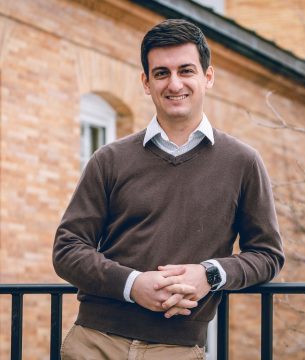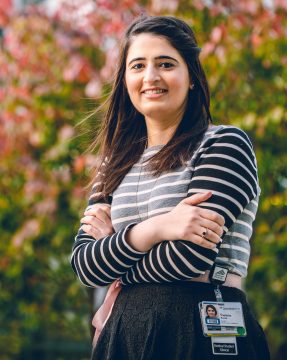“Our goal is to have medical students gain the skills they need to become good physician scientists and researchers,” says Yasmin Kamal, MD-PhD ’22. Including a need to understand and effectively communicate scholarly literature.
Kamal is referring to Geisel School of Medicine’s Science Scholars program, which a few years ago she and fellow student Marek Svoboda, MD-PhD ’24, formalized and restructured—taking it beyond a student interest group to a preclinical elective within the curriculum.
Their journey is described in a paper, “Science Scholars Curriculum: Integrating Scientific Research into Undergraduate Medical Education through a Comprehensive Student-Led Preclinical Elective,” published today in MedEdPORTAL. Lead authors Kamal and Svoboda, and senior author Roshini Pinto-Powell, MD, professor of medical education, and Science Scholars advisor, layout the benefits of familiarizing future physicians with the scientific method.

Science Scholars, which is under the auspices of the MD-PhD program, consisted of a few MD-PhD student mentors alternatively hosting a loosely organized collection of ad hoc talks by researchers available to interested medical students. This lack of organization and structure meant students were not receiving a solid foundation in scientific research.
Kamal and Svoboda sought to change that.
They, with guidance from Pinto-Powell, began by creating a set of faculty-taught workshops specifically designed to provide students with needed skills in, for example, clinical trials (structured research studies) taught by William Rigby, MD, emeritus professor of microbiology and immunology, who is known for his clinical trials work.
“We soon realized that while the workshops were available to all interested first-year medical students, attendance was very low,” Svoboda says. “After that first year, we formalized the program and created a curriculum—if someone wanted to take advantage of this new curriculum, they needed to apply and be accepted. Workshop attendance became mandatory and enrolled students would complete and present a required final project.”
They next focused their attention on mentorship. Previously, MD-PhD students mentored first-year medical students, but Kamal and Svoboda expanded that to include both graduate students from Dartmouth and former Science Scholars (current second- and third-year medical students) to serve as mentors—meeting monthly with students.
As the curriculum evolved, their faculty advisor suggested studying the intervention. A sizeable number of medical students at Geisel and other medical schools look for and engage in research during their first-year summer. It was an opportunity to study whether the specific research curriculum and peer mentorship had led to an increase in the percentage of Geisel students in the program securing funding for summer research projects—both nationally and locally.
Unable to find comparable programs described in the literature, neither literature reviews nor at other medical schools, the team realized they had created a unique curriculum. Geisel is the only medical school with a formal peer mentoring program where medical students interested in becoming physician scientists receive research-related training.

With Pinto-Powell’s encouragement, the pair presented their findings in a poster at the Society of General Internal Medicine and the International Association of Medical Science Educators national conferences where the response to their presentations was overwhelmingly favorable—those from other medical schools began seeking advice about adapting the program. “People want to know how they can make this functional and viable at their school,” Kamal says. Though designed with medical students in mind, the curriculum can be taught in any healthcare professional school.
Pinto-Powell feels strongly that the shift to translational research makes it even more critical for physicians and trainees to be able to ask the right clinical questions, find and understand relevant scientific literature, and find and manage scientific resources. “It is important for all students to have the opportunity to hone these useful research skills,” she says.
And with a shift to focusing on the clinical aspects of medicine underway in medical education, the Science Scholars curriculum can create balance.
“I agree with Dr. Pinto-Powell about the importance of training physicians to have a strong background and literacy in basic science,” Kamal says. “With the availability of the COVID-19 vaccine, for example, doctors need to understand the basic principles of how it works in order to explain it to patients. This curriculum can help medical schools transitioning to a clinical focus to integrate more basic science.”
One of the program’s strengths is giving medical students without experience who are interested in scientific research a chance to get involved, Svoboda says, “Without this program there are few opportunities to jump into this world—we explicitly say on the application for scholars that no prior research experience is necessary and welcome everyone eager to get started.”
In a program traditionally led by MD-PhD students, Svoboda and Kamal are proud of what they have accomplished by successfully bringing together not only the medical school and broader Dartmouth community, but the research community as well. “It’s why we really wanted to create a sustainable Science Scholars curriculum for the long term,” Svoboda adds.
Pinto-Powell credits Svoboda and Kamal for their exemplary work in developing, studying, and publishing this important curriculum. “This has been the culmination of many years of hard work and persistence,” she says. “I am always amazed at what our incredible students accomplish in their “non-existent spare time.”
This year, Kamal and Svoboda passed the torch to Steven Tau MD-PhD ’25 and Abigail Dutton MD-PhD ’26 who lead the Science Scholars coordinators with fellow students, Abigail Keim MD-PhD ’27 and Timothy Renier MD-PhD ’27.
“We are continuing to build on the success of the program transformed by Marek and Yasmin that includes establishing new workshops for students and expanding faculty facilitators to interact with the scholars,” Tau says.
“An exciting addition this past year was coordinating a panel of early-stage investigators—pulmonologist Laura Paulin, MD; pediatric hospitalist JoAnna Leyenaar, MD; cardiologist Lauren Gilstrap, MD; and pediatric hematologist oncologist Bonnie Lau, MD—who discussed initiating a career in academic medicine.”
Tau believes the strength of Science Scholars is the high-quality and informative workshops, and the continual striving for improvement by its student leaders. “We incorporate their feedback year-over-year to better our programming and approach in order to prepare the scholars for their summer research experience and beyond.”